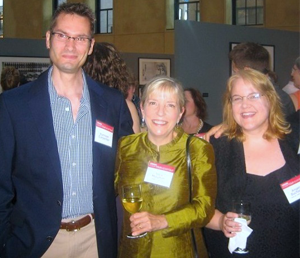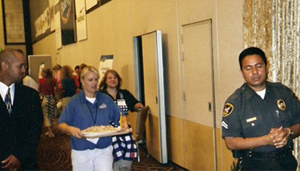Five questions for Angela Buchanan
Angela Buchanan, right, and her husband, Harrison, with chef Sarah Moulton at a Good Housekeeping event in New York City.
There are times in everyone’s life when they need a little support to succeed. At the University of Colorado Boulder, Angela Buchanan is a senior instructor specializing in writing and rhetoric through the Student Academic Services Center, a multicultural learning community that helps develop the skills needed in college and beyond.
Buchanan’s courses emphasize research skills, discursive versatility and critical thinking. As part of the McNeill academic team, she also works on issues related to academic success, retention, academic transitions and student development. She also works individually with students. Before working with SASC, Buchanan was a faculty member of Boulder’s Program for Writing and Rhetoric and CU Denver’s laptop classroom.
In her personal life, she melds a passion for the written word and food in a blog that features her own recipes – usually seasonal and vegetarian -- including many that are contest winners. Each year, Buchanan and her husband, Harrison Carpenter, purchase a Community Supported Agriculture (CSA) share and she enjoys coming up with new recipes for whatever shows up in the box.
Angela Buchanan is escorted by Pillsbury security to the judge’s table during a Pillsbury Bake-off in Los Angeles.
“Some things are more challenging than others,” she says. “Last year I grew really tired of daikon radish, for instance, and pretty much hit a creative wall. I have a huge spice collection and my current favorite is Aleppo pepper, which is mildly fruity with a low level of heat.”
She has learned photography, in part so that she can illustrate her dishes, but also because she loves learning. “My primary life goal is to not get too complacent and to be sure I am continually learning new things. My most pressing short-term goal is to have some pet chickens. We are working on the coop.”
1. Why did you choose writing/teaching as a career?
My undergraduate degree was in political science, and my first real post-undergraduate job was with a political consulting firm specializing in pay equity issues and the Americans With Disabilities Act. My research interests have always focused on social justice and language, so shifting to graduate studies in rhetoric felt natural. As a graduate student I discovered a love for teaching and for dealing with difficult subject matter, and my interest in teaching has only grown deeper over the years. The classroom is a place of great potential for growth and change, and ultimately I began to see that as the most integral space for civic action. My work with SASC combines my interests in diversity and social justice with my love for teaching and the written word, so it all comes together.
2. How do students become part of SASC and why is the program important for the university and the community in general?
Students may be admitted by the McNeill program via our coordinated efforts with admissions, or they may self-select and apply to the program. Many students “find” us as they seek out a multicultural campus community and academic support system.
It would be difficult to overemphasize the importance of the program. CU has a stated commitment to diversity that is often not visible on campus, and for first-generation college students coming in without cultural knowledge of how college “works,” it is essential to provide information and community. Since I was a first-generation college student, I have a deep personal understanding of how much an experienced voice can help you negotiate on unfamiliar terrain. Similarly, for all under-represented students on campus, is it essential to have a place to call home, and we provide that space and those resources.
3. What are some of the lessons you teach to your students about writing?
Writing is really about a process of thinking, so it is important to recognize that if you are thinking in a complex way, which is always desirable, you will end up with some really messy stages on the page. Getting people to turn off their internal editor during early stages is really important, which often means disabusing students of some early notions of what “good writing” looks like in process. Really beautiful writing looks easy, but it is a rare individual who produces that kind of writing without multiple drafts.
4. You write a food blog titled Seasonal and Savory. Why do you write about food and why a blog?
I started blogging in part because I was questioning some of my own teaching assumptions about audience and writing, and I am a fan of practicing what you advocate. The nature of writing and publication has changed dramatically over the last decade, and blogging and e-publishing have redefined the ways we have to think about audience. Intellectually, that was a large part of my motivation. Emotionally, I was looking for an outlet that felt purely creative, and food blogging really met that need. I had been involved in competitive cooking for a few years and I knew I had a particular perspective to offer on foodways and recipe development, and the challenge of learning to translate ideas visually was really appealing. Photography has been a real learning curve, and has become a new passion. Learning new things is always fun, as well as frequently frustrating, and it makes me a better teacher when I am in touch with those experiences.
Personally, blogging has provided opportunities to meet lots of interesting people, typically in non-academic fields, so it helps provide some life balance. Blogging and competitive cooking have taken me all over the country. I have attended cook-offs, conferences and foodie events in San Francisco, New York City, Dallas, Los Angeles, Chicago, Atlanta and Orlando. San Francisco is by far my favorite food city, but I love discovering regional cuisines wherever we go. Fellow food bloggers are wonderful at letting you know about must-try places, so we typically enjoy the food in any city, large or small.
5. What is a favorite memory from your CU experience?
Every year we hold a graduation ceremony for McNeill students who are completing degrees. Our former director, Susan Smith, is an amazing speaker and a powerful influence on so many of our students, and the ceremony has always been a reflection of her vision of the program. It is always a profoundly moving experience to be able to see one of your former students graduate and move on to do great things, and the ceremony is an expression of what we do together as a community, as well as a celebration of our students. It is beautiful.



